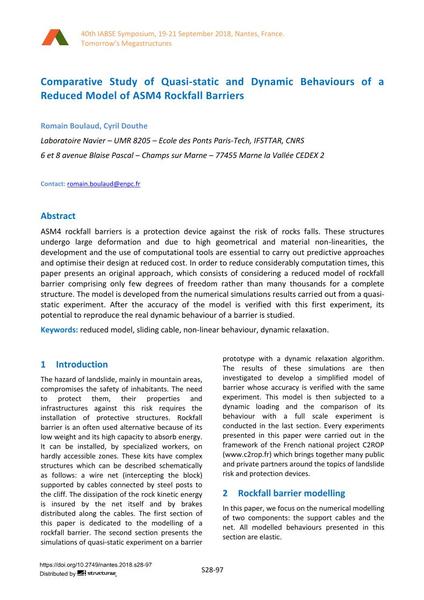Comparative Study of Quasi-static and Dynamic Behaviours of a Reduced Model of ASM4 Rockfall Barriers

|
|
|||||||||||
Détails bibliographiques
| Auteur(s): |
Romain Boulaud
(Laboratoire Navier – UMR 8205 – Ecole des Ponts Paris-Tech, IFSTTAR, CNRS, 6 et 8 avenue Blaise Pascal – Champs sur Marne – 77455 Marne la Vallée CEDEX 2)
Cyril Douthe (Laboratoire Navier – UMR 8205 – Ecole des Ponts Paris-Tech, IFSTTAR, CNRS, 6 et 8 avenue Blaise Pascal – Champs sur Marne – 77455 Marne la Vallée CEDEX 2) |
||||
|---|---|---|---|---|---|
| Médium: | papier de conférence | ||||
| Langue(s): | anglais | ||||
| Conférence: | IABSE Symposium: Tomorrow’s Megastructures, Nantes, France, 19-21 September 2018 | ||||
| Publié dans: | IABSE Symposium Nantes 2018 | ||||
|
|||||
| Page(s): | S28-97 | ||||
| Nombre total de pages (du PDF): | 9 | ||||
| DOI: | 10.2749/nantes.2018.s28-97 | ||||
| Abstrait: |
ASM4 rockfall barriers is a protection device against the risk of rocks falls. These structures undergo large deformation and due to high geometrical and material non-linearities, the development and the use of computational tools are essential to carry out predictive approaches and optimise their design at reduced cost. In order to reduce considerably computation times, this paper presents an original approach, which consists of considering a reduced model of rockfall barrier comprising only few degrees of freedom rather than many thousands for a complete structure. The model is developed from the numerical simulations results carried out from a quasi- static experiment. After the accuracy of the model is verified with this first experiment, its potential to reproduce the real dynamic behaviour of a barrier is studied. |
||||
